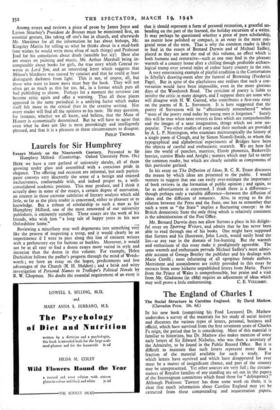Laurels for Sir Humphrey
Essays Mainly on the Nineteenth Century. Presented to Sir Humphrey Milford. (Cumberlege. Oxford University Press. 15s.) HERE we have a rare garland of university shrubs, all of them growing under glass and assembled with a conscious pride in elegance. The offering and occasion are informal, lint each partici- pator conveys very discreetly the sense of a benign and enjoyed exclusiveness, conformable with, and indeed proper to, a well- consolidated academic position. This may produce, and I think it actually does in some of the essays, a certain degree of enervation, an interest in those extreme subtleties of literary analysis which add little, so far as the plain reader is concerned, either to pleasure or to knowledge. But a tribute of scholarship to such a man as Sir Humphrey Milford, one of the most renowned of our university publishers, is eminently suitable. These essays are the work of his friends, who wish him " a long tale of happy years in his new Oxfordshire home."
Reviewing a miscellany may well degenerate into something very like the process of inspecting a troop, and it would clearly be an impertinence if I were to pass along this line of eminent writers with a perfunctory eye for buttons or buckles. Moreover, it would not be at all easy to find a dozen essays more varied in style and intention than the dozen in this volume. For example, Helen Darbishire follows the pedlar's progress through the mind of Words- worth ; we have an essay on the hopes, predicaments and lost advantages of the Church (R. H. Malden) ; and a brisk and witty investigation of Personal Names in Trollope's Political Novels by R. W. Chapman. No doubt the essential requirement of an essay is that it should represent a form of personal recreation, a graceful un- bending on the part of the learned, the holiday excursion of a writer. It may perhaps be questioned whether a piece of pure scholarship, no matter how polished or compact, is an essay in the more con- genial sense of the term. That is why the common reader is likely to find in the essays of Bernard Darwin and of Michael Sadleir, placed as they are near the end of this volume, an effect which is both humane and restorative—such as one may find in the pleasant warmth of a country house after a chilling though profitable archaeo- logical tramp over several miles of rather heavy country in the rain.
A very entertaining example of playful erudition is the Conversation in Sibylla's drawing-room after the funeral of Browning (Frederick Page). But in spite of the playfulness one realises that such a con- versation would have been impossible, even in the more glorious days of the Woodstock Road. The criticism of poetry is liable to involve the critic in many dangers, and I suppose there are some who will disagree with H. W. Garrod, who contributes a first-rate essay on the poems of R. L. Stevenson. It is here suggested that the poetry of Stevenson will be " affectionately remembered " when most of the poetry read today by young men is forgotten." Surely this will be true when taste reverts to lines which are comprehensible and the images of a sane imagination, things which are now un- popular. Two other studies of poets and their methods are provided by A. L. P. Norrington, who examines microscopically the history of a single poem of Clough, and by Simon Nowell-Smith, to whom the typographical and alphabetical experiments of Bridges have been the objects of careful and enthusiastic research. We are here led into the world of punches, matrices, Elstob phonetics, Baskervilie brevier, cursive Blado and Arrighi ; matters which may fail to excite the common reader, but which are clearly suitable as components of this particular garland.
In his essay on The Diffusion of Ideas, R. C. K. Ensor discusses the means by which ideas are presented to the public. I would venture to suggest that one can easily over-estimate the importance of book reviews in the formation of public opinion ; and again, so far as advertisement is concerned, I think there is a difference— though perhaps only a variable difference—between the diffusion of ideas and the diffusion of tomatoes. Also, in trying to fix the relation between the Press and the State, one has to remember that such a term as " the State " implies a fluctuating concept : in the British democratic State the only thing which is relatively consistent is the administration of the Post Office.
Mr. Bernard Darwin does not allow Surtees a place in his delight- ful essay on Sporting Writers, and admits that he has never been able to read through one of his books. One might have supposed that Surtees and his illustrator, John Leech, would easily head the list—at any rate in the domain of fox-hunting. But the warmth and enthusiasm of this essay make it prodigiously agreeable. The same warmth and enthusiasm pervade Michael Sadleir's most admir- able account of George Bentley the publisher and his dealings with Marie Corelli ; most infuriating of all egregious female authors. Merriment and astonishment are richly provided in this essay by extracts from some hitherto unpublished letters from Marie. Praise from the Prince of Wales is comprehensible, but praise and a visit from Mr. Gladstone (in 1889) require an adjustment of ideas which may well prove a little embarrassing. C. E. VULLIAMY.






























 Previous page
Previous page